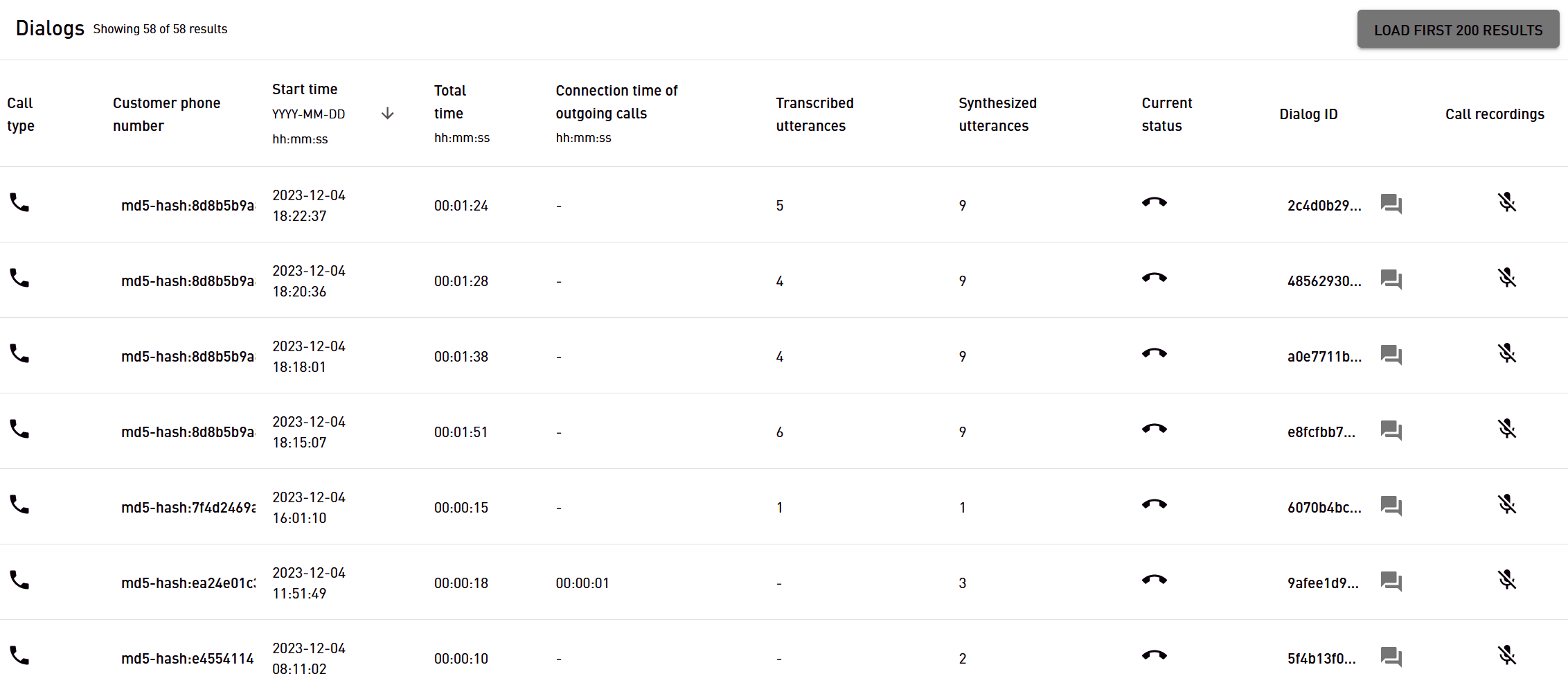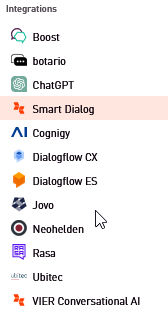CVG 1.36.0 (06-Dec-2023)
Welcome to the festive CVG Saint Nicholas Day release, where we unwrap a collection of exciting features and enhancements. Embrace the spirit of the season with optional phone number anonymization, delve into enriched caller and destination information, try dynamic speech profiles and explore the growing world of our ChatGPT integration.
To ensure the security of your interactions, we’re introducing a new layer of protection with authTokens. These tokens enhance the security of your bots, providing a secure authentication mechanism and adding an extra safeguard to your conversational experiences.
In addition, we now also offer a Speech-to-Text engine for German, which we host in our VIER Cloud so that no data is sent to the manufacturer. This reinforces our commitment to data privacy and security, ensuring that your sensitive information stays within the trusted confines of our secure infrastructure.
Uncover the magic with us in this joyous release, where we prioritize both innovation and security!!

Optional Anonymization of Phone Numbers
Background
Current jurisprudence allows us, as providers of telecommunications services in Germany, to forego storing telephone numbers.
In two model cases, the German Federal Administrative Court decided in judgments dated August 14, 2023 (ref. 6 C 6.22 and 6 C 7.22) that the provisions in Section 175 TKG Paragraph 1 Sentence 1 in conjunction with Section 176 TKG (or Section 113a Paragraph 1 Sentence 1 in conjunction with Section 113b of the old version of the TKG) regulated obligation of providers of publicly accessible telecommunications services to store the telecommunications traffic data mentioned therein in its entirety incompatible with Article 15 Paragraph 1 of the Data Protection Directive for Electronic Communications (Directive 2002/58/EC) and therefore is not applicable.
Since an interpretation that conforms to EU law is not possible due to the principle of specificity and clarity of norms highlighted by the ECJ, the regulation in the TKG may not be applied due to the priority of application of Union law. This means that Sections 175 to 181 TKG are no longer applicable.
Activation Process
In this release, we introduce the ability to store telephone numbers of calls in an anonymized manner. This feature is applicable to all new dialogs; however, it is not yet available for existing dialogs. Users can enable this functionality through the new privacy option “Anonymize phone numbers for dialog history and billing.” in the data protection section of the project settings. This ensures that all new dialogs will have their phone numbers stored in an anonymized format.

Anonymization Technique
Phone numbers are anonymized using a hash key generated through the MD5 hash algorithm. This replaces the actual phone numbers in the data storage, enhancing privacy and security. The same phone number will always result in the same hash key.
The anonymization of telephone numbers is irreversible
Once phone numbers are anonymized for data storage, there is no feasible method to de-anonymize them later. You should exercise caution and be aware that this irreversible process ensures the continued protection of sensitive information.

Future Enhancement
In upcoming releases, users can anticipate an additional option to retrospectively anonymize phone numbers that were not originally anonymized. This feature will include an adjustable period of time, offering flexibility in implementing anonymization after phone numbers have been available “clear” for a while.
Enhanced Caller Phone Number and Transfer Destination Information
Understanding the type, country, and region of the caller phone numbers and transfer destination phone numbers is crucial for analytic insights and billing purposes. Previously, you had to manually extract this information from phone numbers, but we now simplify the process.
Automatic Data Capture
CVG now automatically saves the type, country, and region information for both the caller’s phone number and the phone number of the transfer destination. This applies whether or not anonymization for storing phone numbers is activated.
Supported Data Values
Type: Users can identify the nature of the phone number, with possible values including FIXED-LINE, INTERNET, MOBILE, PREMIUM-RATE, and SHARED-COST.
Country: ISO 3166 country code (Alpha-2 code) provides information about the country of the phone number.
Region: The region can be a country, state, region, or city associated with the phone number
Availability of Data
You can now access this additional information type, country and region
for each phone number in the new columns of the Excel/CSV export of dialogs (applicable to exports made both via the UI and the API, see image below)
aggregated by type and country in the billing data (see section below)

We believe these enhancements will significantly improve your analytical capabilities and billing efficiency. As always, we welcome your feedback to further refine and optimize our features.
Breaking down of Billing Data
Previously, you could only view a total count of outgoing minutes under the “Billing” section. In this update, we’ve magnified this view by breaking down the total into two categories – by country and by phone number type. This granular view can help you analyze costs and chargebacks more effectively. You also can set up your analytics more accurately. It will allow you to gain more in-depth insights and make data-driven decisions based on your specific business needs.

Improved ChatGPT Integration
Smart Dialog
Our integration of ChatGPT is different from our other Conversational AI integrations. You do all the bot configuration in the CVG UI. We decided to make this integration also available as a separate bot template “Smart Dialog”. Now, you can access and utilize this ChatGPT integration using the “Smart Dialog” bot template that we have introduced. This offers an intuitive, structured environment for managing dialog flows and interacting with ChatGPT.

The ChatGPT template will continue to be available “as is”.
ChatGPT Errors produce custom Health Events
As part of our efforts to provide more insight into the dialogue process, we have added the capability to create custom Health Events within a dialog. Expanding on our recent addition of custom Health Events, we’ve imbued our ChatGPT integration to generate these events should the ChatGPT API encounter any errors, such as an unfulfilled completion request. These newly generated custom health events are not limited to API errors but also provide visibility into potential limitations faced by ChatGPT, including exceeding maximum token limits or the maximum number of requests per minute.
With these new enhancements, your are now able to find and understand why certain dialogs may not operate as expected, offering a chance to rectify issues.
Custom data sent by ChatGPT integration filter null Values
When ChatGPT generates JSON data for storage in CVG, instances where CVG generates null as values for specific keys are now addressed. To enhance data quality and reduce redundancy, such keys with null values are filtered during the storage process.
Dynamic Speech Service Profiles
Dynamic STT Profiles for ad-hoc Phrase List Hints
We have introduced dynamic STT Profiles so that your bots can easily provide phrase lists as hints for transcription based on the context. You can provide an ad-hoc transcriber profile to dynamically specify phrase boosts such as {"vendor": "GOOGLE", "boostedPhrases": ["flour"]} when requesting the endpoint /call/transcription/switch.
Dynamic STT profiles are available for Microsoft and Google only
You can use dynamic profiles to provide phrase list hints for Microsoft and Google Speech-to-Text only.
Dynamic TTS Profiles
Additionally we have introduced dynamic TTS profiles. Your bot can use such dynamic TTS profile to switch to a another TTS Voice. E.g. you can provide an ad-hoc TTS profile to set a specific TTS voice with parameters like {"vendor": "GOOGLE", "voice": "de-DE-Wavenet-A"} when requesting the endpoint /call/say.
Speech-to-Text Engine operated by VIER (German only)

After leveraging VIER Cloud for Text-to-Speech (TTS) operations with Nuance for an extended period, we are thrilled to introduce the official availability of Speech-to-Text (STT) in the VIER Cloud.
In this initial phase, we’re launching support for EML exclusively for the German language in the VIER Cloud. This expansion means that German-speaking bots can now seamlessly utilize both STT (EML) and TTS (Nuance) entirely within the secure confines of the VIER Cloud.No user data is transmitted to external vendors during these operations.
We’re committed to providing a secure and streamlined experience for you and your customers, and this enhancement aligns with our dedication to maintaining the highest standards of data protection.
EML STT profiles is available in our European region only
Please be aware that EML STT is not available in our US region.
Security: Authentication of Bots against CVG’s APIs
Incremental Introduction of Authentication of Bots against CVG’s APIs
Currently, bots use the CVG API without explicit authentication. Instead, the dialogId is used for implicit authentication.
To meet the increased security requirements of you and your customers, we are now introducing authentication of bots against the CVG APIs.
The introduction of such authentication of bots against CVG’s APIs will take place in stages:
Now (6-Dec-2023): Provision of optional authentication and information to our customers.
By April 2024: Conversion of the Conversational AI integrations provided by VIER (Botario, ChatGPT, Cognigy, Dialogflow, Rasa) by VIER.
By the end of 2024: Conversion of our customers’ Conversational AI integrations (including boost.ai, msg neohelden) and direct API usage by our customers.
This is changing now
CVG requests to the endpoint /bot/session implemented by your integration resp. bot now additionaly includes the parameter authToken.
Your integration resp. bot can use this token to authenticate against CVG’s APIs by sending it as bearer token. This is optional for now but required by the end of 2024.
Action required
Use of the bots' authentication required from the start of 2025
If you use one of the Conversational AI integrations we provide (Botario, ChatGPT, Cognigy, Dialogflow, Rasa), there is no need for you to take any action.
If you use our CVG API directly or have developed an integration yourself, it is essential that you use the authentication of your bots against the CVG API by the end of 2024. We will be happy to support you with this changeover if required.
Smaller Improvements and Fixes
Enhanced SSML Stripping for Improved Dialog Display in UI
we’ve made improvements to the Speech Synthesis Markup Language (SSML) stripping process, particularly when displaying dialogs in the user interface. Previously, some instances of SSML stripping led to sentences starting without spaces after a period, impacting the visual presentation of messages. We have meticulously corrected the SSML stripping mechanism to ensure a more aesthetically pleasing display of dialogs.
Improved Timeliness of Aggregated User Input
In response to user feedback, we’ve addressed an issue where aggregated user input was occasionally delivered late, particularly when interacting with other timeouts. We have successfully resolved this issue, ensuring a more seamless and timely delivery of aggregated user input. We appreciate your patience and continued support as we strive to enhance your experience with our platform.